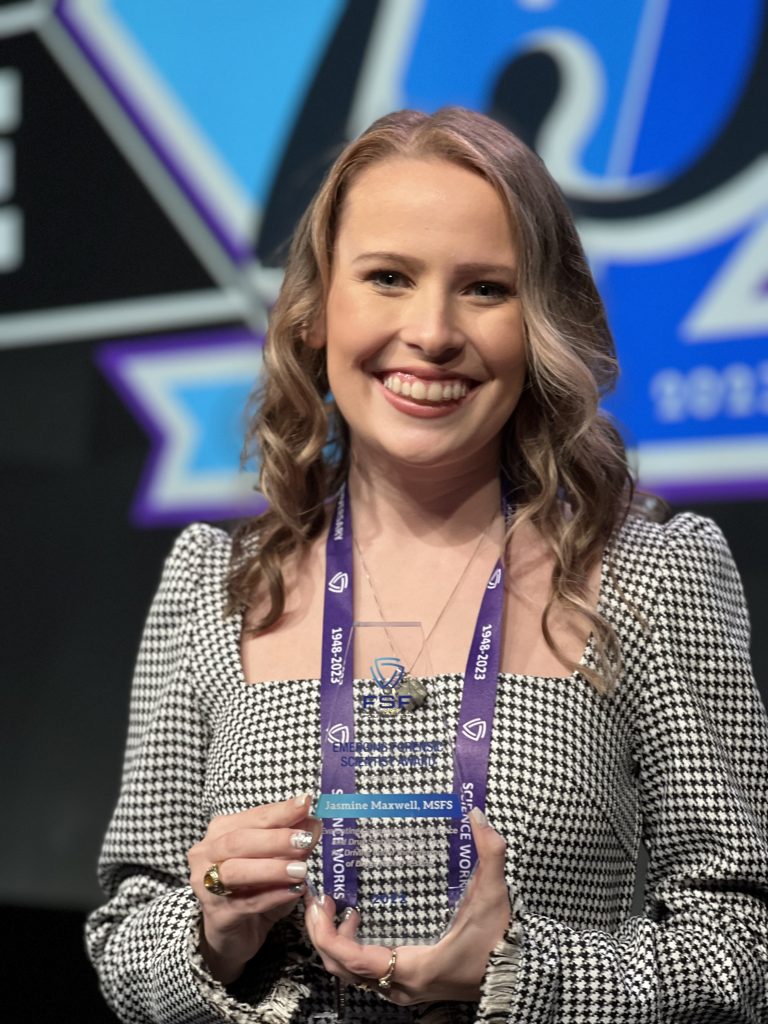
National Center on Forensics
Web-Based Learning Opportunities
Overview
The University of Alabama, in partnership with the Alabama Department of Forensic Sciences and The University of Alabama at Birmingham Department of Criminal Justice have joined together to form the NIJ National Center on Forensics. This Center provides medico-legal learning opportunities for medical students to train as deputy medical examiners/coroners, with a special emphasis for those planning to live and work in underserved rural areas; provide forensic science and legal training to district attorneys, defense attorneys, judges, law enforcement and forensic scientists; and develop opportunities to benefit current and future practitioners in the field. These activities seek to improve the availability and level of medico/legal training and knowledge for those working in rural areas, which will thereby increase access to justice for those living in these communities.
Who Should Attend
The Forensic Science Certificate and Continuing Education Program is designed for forensics practitioners, justice system professionals, members of law enforcement, the medical community and those with a personal interest in learning more about the science and techniques employed in the field. It is offered by The University of Alabama’s National Center on Forensics, which was created in response to the critical need for improved medical legal death investigation, regionally and nationally. Continuing education credits are available, and the program – offered in several study tracks with different areas of focus – is free through 2024. Learn more about the National Center on Forensics, meet the team, and find additional resources or more about other upcoming events.
Essentials Training
Essentials of Forensic Science
The Essentials Training is comprised of five courses:
- Essentials of Death Investigation
- Essentials of Firearm/Tool Mark
- Essentials of Forensic Biology
- Essentials of Forensic Toxicology
- Essentials of Drug Chemistry
Essentials of Firearm/Tool Mark
Module 1: Firearms Case Acceptance Policy
Module 2: Best Practices in Collection of Firearms Evidence
Module 3: Evidence Testing in Firearms
Module 4: Emerging Trends in Firearms
Course Level Learning Objectives:
- List the types of firearms evidence that are commonly accepted by laboratories and the types of evidence not commonly accepted by laboratories.
- Describe the process for collecting, packaging, and labeling firearms evidence.
- Describe the laboratory analysis process for firearms evidence.
- Identify the trends in the number of firearms cases submitted to firearms analysis labs.
Registration and Course Dates
Registration Opens: January 12, 2026
Registration available through December 15, 2026
Essentials of Forensic Biology
Module 1: Forensic Biology Case Acceptance Policy
Module 2: Best Practices in Collection of Forensic Biology Evidence
Module 3: Evidence Testing in Forensic Biology
Module 4: Emerging Trends in Forensic Biology
Course Level Learning Objectives:
- List the types of biological evidence that are commonly accepted by laboratories and the types of evidence not commonly accepted by laboratories.
- Describe the process for collecting, packaging, and labeling biological evidence.
- Describe the laboratory analysis process for biological evidence.
- Identify emerging areas of analysis in Forensic Biology.
Registration and Course Dates
Registration Opens: January 12, 2026
Registration available through December 15, 2026
Essentials of Forensic Toxicology
Module 1: Overview of Forensic Toxicology
Module 2: Polydrug Use in Forensic Toxicology
Module 3: Postmortem Oral Fluid Testing in Forensic Toxicology
Module 4: Lethal Injection Cases and Forensic Toxicology Testing
Module 5: Trends in Drugs of Abuse and Driving
Registration and Course Dates
Registration Opens: January 12, 2026
Registration available through December 15, 2026
Essentials of Drug Chemistry
Module 1: Drug Chemistry Case Acceptance Policy
Module 2: Best Practices in Collection of Drug Chemistry Evidence
Module 3: Evidence Testing in Drug Chemistry
Module 4: Emerging Trends in Drug Chemistry
Course Level Learning Objectives:
- List the types of drug chemistry evidence that are commonly accepted by laboratories and the types of evidence not commonly accepted by laboratories.
- Describe the process for collecting, packaging, and labeling drug evidence.
- Describe the laboratory analysis process for drug evidence.
- Identify emerging areas of analysis in Drug Chemistry.
Registration and Course Dates
Registration Opens: January 12, 2026
Registration available through December 15, 2026
Essentials of Death Investigation
Module 1: Case Acceptance Policy
Module 2: Best Practices in Collection
Module 3: Evidence Testing
Course Level Learning Objectives
- Describe the purpose of and common terms around death investigation.
- Identify best practices in the collection of evidence during a death investigation.
- Identify specialists, other than the medical examiner, who may be required for completion of a postmortem examination.
- Associate types of evidence with time, cause, and manner of death.
Registration and Course Dates
Registration Opens: January 12, 2026
Registration available through December 15, 2026
Breath Testing Recertification
Alabama Breath Testing Operator Recertification
Module 1: Identification of when to collect Oral Fluid Samples for Roadside Screening or Confirmation Testing
Module 2: State Statues for Roadside Screening and Confirmation Testing Using Oral Fluid
Module 3: Roadside Screening of Oral Fluid Using Dräger DrugTest 5000
Module 4: Roadside Screening of Oral Fluid Using Abbott SoToxa™ Mobile Test System
Module 5: Collection of Oral Fluid Evidentiary Sample Using Quantisal™ Oral Fluid Collection Device
Module 6: Submission of Oral Fluid Evidentiary Sample Collected using Quantisal™ Oral Fluid Collection Device
Roadside Oral Fluid Testing is an on-demand six-module self-paced course.
Law enforcement officers face the challenge of keeping motorists safe when irresponsible drivers get behind the wheel under the influence of drugs that cannot be detected using a breathalyzer. New roadside screening instruments have been developed to detect these drugs in oral fluid samples and can be performed by certified officers similar to using a breathalyzer to detect alcohol in breath. This course describes two roadside instruments for testing oral fluid and also describes a method for collecting an additional oral fluid sample to be sent to the lab for confirmation testing. Officers completing this course will be prepared to take a certification exam, which will qualify them to administer these tests and collections. Officers will view lectures and video demonstrations of using the instruments and collection devices. The course is presented by Curt E. Harper, Ph.D., F-ABFT, Chief Toxicologist with the Alabama Department of Forensic Sciences.
Course Level Learning Objectives:
- Describe the differences between using oral fluid for roadside screening and using oral fluid for evidentiary testing.
- List the screening devices used for roadside screen collection of oral fluids and collection devices used for evidentiary collection of oral fluid.
- Describe your state statues that allow for the use of oral fluid for roadside screening or evidentiary testing.
- Describe the process for collecting and testing a sample for the purpose of roadside screening using an Abbott SoToxa or Draeger DT5000
- Describe the process for collecting oral fluid using Quantisal™ Oral Fluid Collection Device.
- Describe the process for submitting an evidentiary sample to the lab.
Target Audience: Roadside Oral Fluid Testing learning opportunities are appropriate for law enforcement personnel. Continuing education credits will be offered.
Permit No. required in registration. If you’re unsure of your permit number please look it up by clicking on the following link,
Alabama Department of Forensic Sciences, AL.
NOTE: You can only register once. Multiple registrations are not allowed.
Registration and Course Dates
Registration Opens: January 12, 2026
Registration available through December 15, 2026
Course available through December 31, 2026
Other Courses
Oral Fluid Testing in DUID Investigations
Module 1: Identification of when to collect Oral Fluid Samples for Roadside Screening or Confirmation Testing
Module 2: State Statues for Roadside Screening and Confirmation Testing Using Oral Fluid
Module 3: Roadside Screening of Oral Fluid Using Dräger DrugTest 5000
Module 4: Roadside Screening of Oral Fluid Using Abbott SoToxa™ Mobile Test System
Module 5: Collection of Oral Fluid Evidentiary Sample Using Quantisal™ Oral Fluid Collection Device
Module 6: Submission of Oral Fluid Evidentiary Sample Collected using Quantisal™ Oral Fluid Collection Device
Roadside Oral Fluid Testing is an on-demand six-module self-paced course.
Law enforcement officers face the challenge of keeping motorists safe when irresponsible drivers get behind the wheel under the influence of drugs that cannot be detected using a breathalyzer. New roadside screening instruments have been developed to detect these drugs in oral fluid samples and can be performed by certified officers similar to using a breathalyzer to detect alcohol in breath. This course describes two roadside instruments for testing oral fluid and also describes a method for collecting an additional oral fluid sample to be sent to the lab for confirmation testing. Officers completing this course will be prepared to take a certification exam, which will qualify them to administer these tests and collections. Officers will view lectures and video demonstrations of using the instruments and collection devices. The course is presented by Curt E. Harper, Ph.D., F-ABFT, Chief Toxicologist with the Alabama Department of Forensic Sciences.
Course Level Learning Objectives:
- Describe the differences between using oral fluid for roadside screening and using oral fluid for evidentiary testing.
- List the screening devices used for roadside screen collection of oral fluids and collection devices used for evidentiary collection of oral fluid.
- Describe your state statues that allow for the use of oral fluid for roadside screening or evidentiary testing.
- Describe the process for collecting and testing a sample for the purpose of roadside screening using an Abbott SoToxa or Draeger DT5000
- Describe the process for collecting oral fluid using Quantisal™ Oral Fluid Collection Device.
- Describe the process for submitting an evidentiary sample to the lab.
Target Audience: Roadside Oral Fluid Testing learning opportunities are appropriate for law enforcement personnel. Continuing education credits will be offered.
Registration and Course Dates
Registration Opens: January 12, 2026
Registration available through December 15, 2026
Course available through December 31, 2026

Instructors
Jace Daniels
Senior Forensic ScientistAlabama Department of Forensic Sciences, Forensic Biology

Jace Daniels Bio
Mr. Daniels currently serves as the Regional DNA Technical Leader for the Mobile Regional Laboratory and is certified in Molecular Biology by the American Board of Criminalistics. Jace has over nine years of experience in Forensic Biology and has assisted with several validation projects within the laboratory, including bringing the Alabama Department of Forensic Sciences online with the probabilistic genotyping software application STRmix. When he’s not in the laboratory, Jace enjoys going bowling in pursuit of the elusive 300 game.
Matt Grbac
Forensic ScientistAlabama Department of Forensic Sciences

Matt Brnac Bio
Matthew Grbac is a forensic scientist with the Alabama Department of Forensic Sciences. He has worked for the agency since 2018 as a Drug Chemist. His expertise lies in identifying the presence or absence of controlled substances or analogues. Matt obtained his Master’s of Science in Forensic Science and Bachelor’s of Science in Chemistry from the University of Alabama at Birmingham.
Curt E. Harper, Ph.D., F-ABFT
Chief ToxicologistAlabama Department of Forensic Sciences

Curt Harper Bio
Specialties: DUI/D, Oral Fluid Drug Testing, Postmortem Toxicology, Drug Facilitated Sexual AssaultDr. Curt E. Harper has over 15 years of experience as a Forensic Toxicologist. He was appointed Chief Toxicologist for the Alabama Department of Forensic Sciences (ADFS) in 2012. As Chief Toxicologist, he oversees technical operations, method development and validation, and the quality assurance/quality control program. He manages productivity, serves as training coordinator, and develops and maintains standard operating procedures. Dr. Harper has a Ph.D. in Pharmacology and Toxicology and a Master’s of Science in Forensic Science from the University of Alabama at Birmingham. He holds board certification as a Fellow of the American Board of Forensic Toxicology (F- ABFT). He is Chair of the Oral Fluid Committee and former Chair of the SOFT/AAFS Drugs and Driving.
Rebecca Hill
Forensic Scientist and Training CoordinatorAlabama Department of Forensic Sciences Implied Consent Unit

Rebecca Hill Bio
Rebecca Hill is a seasoned forensic scientist and training coordinator for the Alabama Department of Forensic Sciences (ADFS) Implied Consent Unit, with 25 years of dedicated service. Rebecca holds a Bachelor of Science degree in Biology from Alabama State University. She is a certified police officer through the Alabama Peace Officer Standard and Training Commission (APOSTC). Rebecca is also a National Highway Traffic Safety Administration (NHTSA) certified Standardized Field Sobriety Test (SFST) instructor. Additionally, she holds numerous factory certifications in evidential breath testing, portable breath testers, and ignition interlock systems from multiple manufacturers. Rebecca has been instrumental in advancing the Alabama Breath Alcohol Program, playing a vital role in transitioning from the Intoxilyzer 5000 to the Draeger Alcotest 7110 MK-IIIC, and subsequently to the Intoximeter Intox DMT Dual Sensor instrument. Her work in these transitions has been critical in maintaining the accuracy and reliability of breath alcohol testing in the state.
Jasmine Maxwell, MSFS
Forensic ScientistAlabama Department of Forensic Sciences

Jasmine Maxwell Bio
Jasmine Maxwell joined the Alabama Department of Forensic Sciences in December 2021 as a Forensic Scientist in the Breath Alcohol section. In this role, she plays a pivotal role in training over 4,000 breath testing operators annually, conducts calibration and evaluation of evidential breath testing instruments, and provides onsite service to testing locations statewide. Jasmine holds a Master’s of Science in Forensic Science from the University of Alabama at Birmingham, complemented by a Bachelor’s degree in Chemistry from Tennessee Wesleyan University. She is currently enrolled at Oklahoma State University to pursue a Doctoral Degree in Forensic Science. She actively contributes to the forensic science community as the Assistant Treasurer for the Alabama State Association of Forensic Sciences and as the chair of the Training Committee for the International Association for Chemical Testing (IACT).
Allysa A. Robinson
Forensic Pathology CoordinatorAlabama Department of Forensic Sciences

Allysa A. Robinson Bio
Allysa Robinson joined the Alabama Department of Forensic Sciences in 2014 and serves as a Forensic Pathology Coordinator. As an American Board of Medicolegal Death Investigators board-certified Medicolegal Death Investigator, Allysa coordinates the efforts of Death Investigators, Forensic Pathology Specialists, Medical Examiners, and support staff in the intake, investigation, and completion of unlawful, suspicious, and unnatural death cases in Alabama. Her infectious passion, sharp understanding, and immense compassion are evident as she frequently represents the Alabama Department of Forensic Sciences, delivering presentations to external agencies and at the Alabama State Association of Forensic Sciences’ Annual Meeting. Through these opportunities, she aims to educate partner agencies and fellow forensic professionals in the complexities of Death Investigation and Forensic Pathology.
Jaylan Reynolds
Firearm and Toolmark AnalystAlabama Department of Forensic Sciences

Jaylan Reynolds Bio
Ms. Reynolds has worked for the Alabama Department of Forensic Sciences since 2019. Her expertise lies in examining firearms and toolmarks and interpreting the scientific results of the evidence submitted. She is a proud member of the prestigious Association of Firearm and Toolmark Examiners (AFTE) as well as the Alabama State Association of Forensic Scientists (ASAFS).
Gregory Turner, PhD
Technical Director for the Chemical Texts for Intoxication (Implied Consent) DisciplineAlabama Department of Forensic Sciences

Gregory Turner Bio
Gregory Leon Turner, PhD (Greg) received his Bachelor of Science degree in chemistry from Jacksonville State University. After graduating from Jacksonville State, he attended the University of Alabama where he received a Master of Science and Doctor of Philosophy in Physical Chemistry. He has worked as a research chemist for the US Bureau of Mines, and the University of Alabama. Dr. Turner also worked as an analytical chemist for Battelle Memorial Institute stationed at the chemical weapon disposal facility located at Anniston Army Depot in Anniston, Alabama. He started working as a forensic scientist for the Alabama Department of Forensic Sciences in 1998.Dr. Turner is currently the Technical Director for the Chemical Tests for Intoxication (Implied Consent) Discipline of the Alabama Department of Forensic Sciences. In addition to his duties as the Technical Director he also currently serves as the Discipline Chief and Laboratory Director for the Implied Consent Laboratory located in Pelham, Alabama.
Registration
Register Online
You will be taken to our online registration area. The screen will look different from this part of our website and will open in a new window. You will click on the year that you wish to register for. If you are registering more than one person, each person must have an individual email address to utilize the online registration system.
Register by Phone
Our Registration Services Office is open Monday – Friday 8:00 a.m. – 4:45 p.m. To register by phone or for inquiries regarding your registration, please call 205-348-3000.
Review each track to learn more about the courses offered and timing of each course.
Registration Communication
Confirmation of registration will be sent after 5 p.m. on the day of registration. The email will come from registration_services@ua.edu.
Registration Fees
As of now, these online courses are offered free-of-charge to participants.
Special Accommodation Requests
The University of Alabama is committed to complying with the Americans with Disabilities Act. Requests for accommodation of physical and/or dietary needs should be made at least 30 calendar days in advance of the program date. Please email your request to professionaldevelopment@ua.edu.
Need our STAARS Vendor Number? Please use VC000118827 for UA Office of Teaching Innovation and Digital Education.
Cancellation Policy
A cancellation charge of 100% of the registration fee will be assessed on cancellations occurring within seven (7) days of the start of this session. Refunds will not be granted after the program has begun. The University of Alabama reserves the right to cancel, postpone, or combine class sections, to limit registration, or to change instructors. Contact the Registration Services department at 205-348-3000 or registration_services@ua.edu to cancel your registration. View the OTIDE Cancellation Policy.
Questions about the conference?
Box 870330
Tuscaloosa, AL 35487
205-348-8849
To be notified when courses are open for enrollment, join our listserv.
Meet the Staff
A number of professionals, content experts and contributors are instrumental in offering these online training courses. Learn more about the staff by visiting forensicscenter.ua.edu/about.